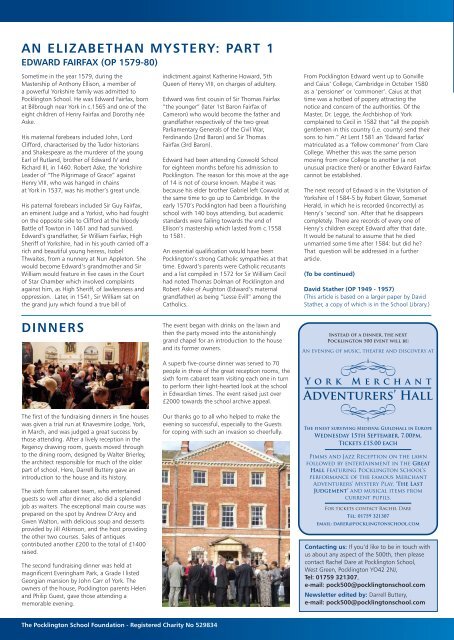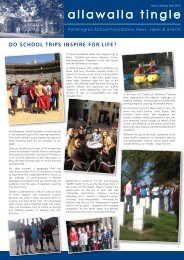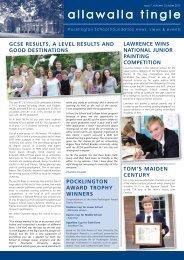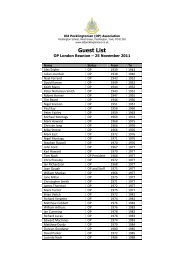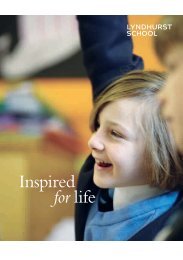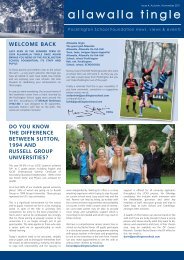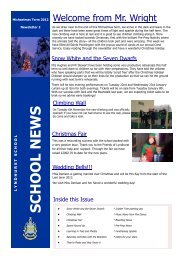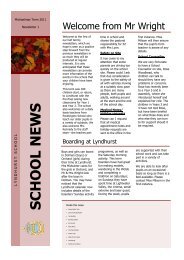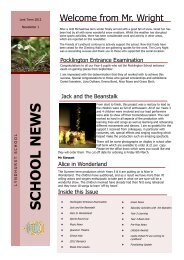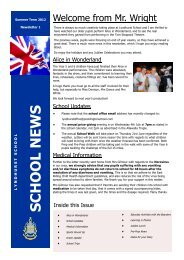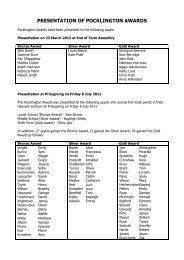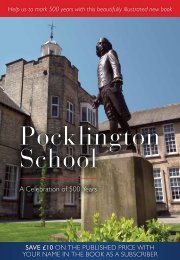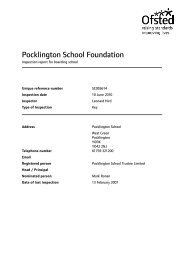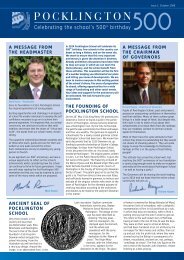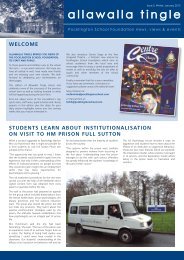Pock 500 ed.4 - outer low - Pocklington School
Pock 500 ed.4 - outer low - Pocklington School
Pock 500 ed.4 - outer low - Pocklington School
Create successful ePaper yourself
Turn your PDF publications into a flip-book with our unique Google optimized e-Paper software.
AN ELIZABETHAN MYSTERY: PART 1<br />
EDWARD FAIRFAX (OP 1579-80)<br />
Sometime in the year 1579, during the<br />
Mastership of Anthony Ellison, a member of<br />
a powerful Yorkshire family was admitted to<br />
<strong>Pock</strong>lington <strong>School</strong>. He was Edward Fairfax, born<br />
at Bilbrough near York in c.1565 and one of the<br />
eight children of Henry Fairfax and Dorothy née<br />
Aske.<br />
His maternal forebears included John, Lord<br />
Clifford, characterised by the Tudor historians<br />
and Shakespeare as the murderer of the young<br />
Earl of Rutland, brother of Edward IV and<br />
Richard III, in 1460. Robert Aske, the Yorkshire<br />
Leader of “The Pilgrimage of Grace” against<br />
Henry VIII, who was hanged in chains<br />
at York in 1537, was his mother’s great uncle.<br />
His paternal forebears included Sir Guy Fairfax,<br />
an eminent Judge and a Yorkist, who had fought<br />
on the opposite side to Clifford at the bloody<br />
Battle of Towton in 1461 and had survived.<br />
Edward’s grandfather, Sir William Fairfax, High<br />
Sheriff of Yorkshire, had in his youth carried off a<br />
rich and beautiful young heiress, Isobel<br />
Thwaites, from a nunnery at Nun Appleton. She<br />
would become Edward’s grandmother and Sir<br />
William would feature in five cases in the Court<br />
of Star Chamber which involved complaints<br />
against him, as High Sheriff, of lawlessness and<br />
oppression. Later, in 1541, Sir William sat on<br />
the grand jury which found a true bill of<br />
indictment against Katherine Howard, 5th<br />
Queen of Henry VIII, on charges of adultery.<br />
Edward was first cousin of Sir Thomas Fairfax<br />
“the younger” (later 1st Baron Fairfax of<br />
Cameron) who would become the father and<br />
grandfather respectively of the two great<br />
Parliamentary Generals of the Civil War,<br />
Ferdinando (2nd Baron) and Sir Thomas<br />
Fairfax (3rd Baron).<br />
Edward had been attending Coxwold <strong>School</strong><br />
for eighteen months before his admission to<br />
<strong>Pock</strong>lington. The reason for this move at the age<br />
of 14 is not of course known. Maybe it was<br />
because his elder brother Gabriel left Coxwold at<br />
the same time to go up to Cambridge. In the<br />
early 1570’s <strong>Pock</strong>lington had been a flourishing<br />
school with 140 boys attending, but academic<br />
standards were failing towards the end of<br />
Ellison’s mastership which lasted from c.1558<br />
to 1581.<br />
An essential qualification would have been<br />
<strong>Pock</strong>lington’s strong Catholic sympathies at that<br />
time. Edward’s parents were Catholic recusants<br />
and a list compiled in 1572 for Sir William Cecil<br />
had noted Thomas Dolman of <strong>Pock</strong>lington and<br />
Robert Aske of Aughton (Edward’s maternal<br />
grandfather) as being “Lesse Evill” among the<br />
Catholics.<br />
From <strong>Pock</strong>lington Edward went up to Gonville<br />
and Caius’ College, Cambridge in October 1580<br />
as a ‘pensioner’ or ‘commoner’. Caius at that<br />
time was a hotbed of popery attracting the<br />
notice and concern of the authorities. Of the<br />
Master, Dr. Legge, the Archbishop of York<br />
complained to Cecil in 1582 that “all the popish<br />
gentlemen in this country (i.e. county) send their<br />
sons to him.” At Lent 1581 an ‘Edward Farfax’<br />
matriculated as a ‘fel<strong>low</strong> commoner’ from Clare<br />
College. Whether this was the same person<br />
moving from one College to another (a not<br />
unusual practice then) or another Edward Fairfax<br />
cannot be established.<br />
The next record of Edward is in the Visitation of<br />
Yorkshire of 1584-5 by Robert Glover, Somerset<br />
Herald, in which he is recorded (incorrectly) as<br />
Henry’s ‘second’ son. After that he disappears<br />
completely. There are records of every one of<br />
Henry’s children except Edward after that date.<br />
It would be natural to assume that he died<br />
unmarried some time after 1584: but did he?<br />
That question will be addressed in a further<br />
article.<br />
(To be continued)<br />
David Stather (OP 1949 - 1957)<br />
(This article is based on a larger paper by David<br />
Stather, a copy of which is in the <strong>School</strong> Library.)<br />
DINNERS<br />
The first of the fundraising dinners in fine houses<br />
was given a trial run at Knavesmire Lodge, York,<br />
in March, and was judged a great success by<br />
those attending. After a lively reception in the<br />
Regency drawing room, guests moved through<br />
to the dining room, designed by Walter Brierley,<br />
the architect responsible for much of the older<br />
part of school. Here, Darrell Buttery gave an<br />
introduction to the house and its history.<br />
The sixth form cabaret team, who entertained<br />
guests so well after dinner, also did a splendid<br />
job as waiters. The exceptional main course was<br />
prepared on the spot by Andrew D’Arcy and<br />
Gwen Walton, with delicious soup and desserts<br />
provided by Jill Atkinson, and the host providing<br />
the other two courses. Sales of antiques<br />
contributed another £200 to the total of £1400<br />
raised.<br />
The second fundraising dinner was held at<br />
magnificent Everingham Park, a Grade I listed<br />
Georgian mansion by John Carr of York. The<br />
owners of the house, <strong>Pock</strong>lington parents Helen<br />
and Philip Guest, gave those attending a<br />
memorable evening.<br />
The event began with drinks on the lawn and<br />
then the party moved into the astonishingly<br />
grand chapel for an introduction to the house<br />
and its former owners.<br />
A superb five-course dinner was served to 70<br />
people in three of the great reception rooms, the<br />
sixth form cabaret team visiting each one in turn<br />
to perform their light-hearted look at the school<br />
in Edwardian times. The event raised just over<br />
£2000 towards the school archive appeal.<br />
Our thanks go to all who helped to make the<br />
evening so successful, especially to the Guests<br />
for coping with such an invasion so cheerfully.<br />
Instead of a dinner, the next<br />
<strong>Pock</strong>lington <strong>500</strong> event will be:<br />
An evening of music, theatre and discovery at<br />
Y o r k M e r c h a n t<br />
Adventurers’ Hall<br />
The finest surviving Medieval Guildhall in Europe<br />
Wednesday 15th September, 7.00pm,<br />
Tickets £15.00 each<br />
Pimms and Jazz Reception on the lawn<br />
fol<strong>low</strong>ed by entertainment in the Great<br />
Hall featuring <strong>Pock</strong>lington <strong>School</strong>’s<br />
performance of the famous Merchant<br />
Adventurers’ Mystery Play, ‘The Last<br />
Judgement’ and musical items from<br />
current pupils.<br />
For tickets contact Rachel Dare<br />
Tel: 01759 321307<br />
email: darer@pocklingtonschool.com<br />
Contacting us: If you’d like to be in touch with<br />
us about any aspect of the <strong>500</strong>th, then please<br />
contact Rachel Dare at <strong>Pock</strong>lington <strong>School</strong>,<br />
West Green, <strong>Pock</strong>lington YO42 2NJ,<br />
Tel: 01759 321307,<br />
e-mail: pock<strong>500</strong>@pocklingtonschool.com<br />
Newsletter edited by: Darrell Buttery,<br />
e-mail: pock<strong>500</strong>@pocklingtonschool.com<br />
The <strong>Pock</strong>lington <strong>School</strong> Foundation - Registered Charity No 529834


